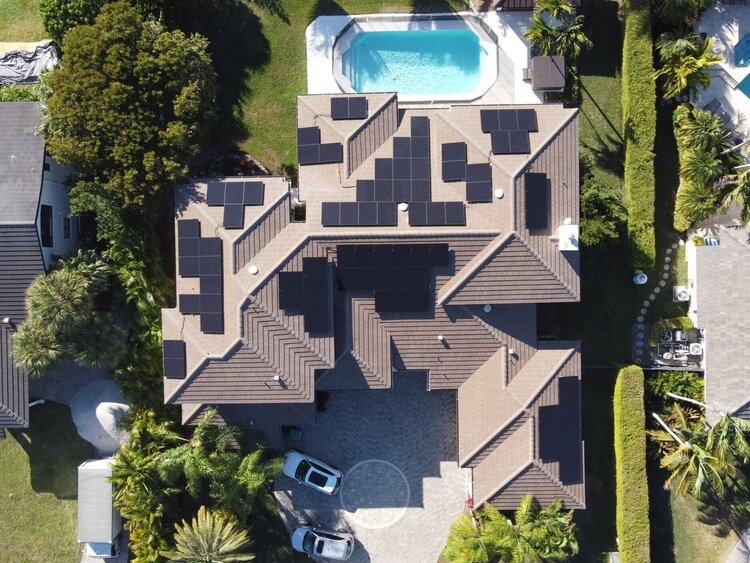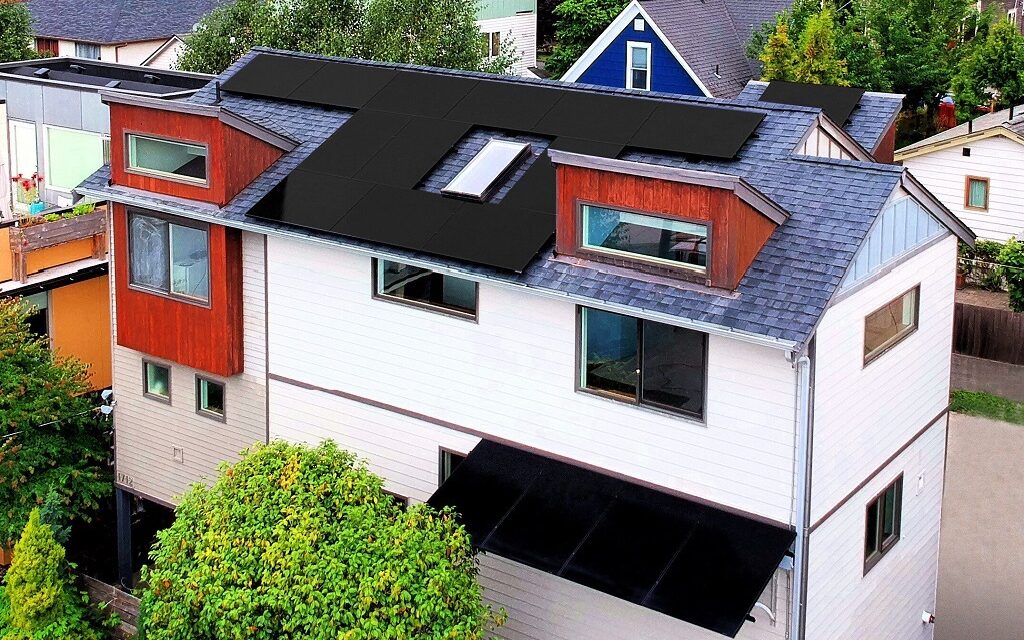The main photo is courtesy of Solaria, which showcases their Solaria PowerXT® Pure Black™ Solar Panels for homes and businesses.
This article explores the factors pertaining to solar panel systems that will either increase the value of your home, or may hinder the sale of your home or deliver a negative return on your investment.
Two popular questions often asked when considering the purchase of a solar panel system for a residential property are:
- “Will solar panels increase the value of my home?”
- “When can I expect to break even on my solar panel investment and start saving money?”
Though solar panels certainly can increase market demand when selling a home, resulting in a higher sale price, many factors need to be understood before investing in solar energy for your property. These circumstances will also help you create a realistic projection model to estimate your break even point on your solar investment that is covered by future cost savings.
Table of Contents
- First Things First: Pay for a Home Energy Audit
- When Can You Expect Your Solar Panel Investment to Break Even?
- The Challenges of Valuing Homes with Solar Panels
- When Solar Panels are likely to Add Value to Your Home
- Estimates of How Much Solar Panels will Increase the Value of Your Home
- When Solar Panels May Hinder the Sale of Your Home
- Solar Panel Resource Links
- Recommended Reading
Also see:
First Things First: Pay for a Home Energy Audit
Though solar panels have become synonymous with energy efficiency, there are many ways to improve the overall energy performance of your home BEFORE investing in a costly solar panel solution. To get a detailed understanding of your home’s current performance issues, we highly recommend hiring a certified Home Performance Contractor, from BPI, the Building Performance Institute, to conduct a Home Energy Audit. BPI is the nation’s leading standards development and credentialing organization for residential energy auditing and upgrade work.
A thorough home energy assessment can provide many cost-effective recommendations that can dramatically improve the overall performance of a home, potentially reducing energy bills by 5% to 30%. Recommendations are typically categorized across the following areas:
- Appliances & Electronics
- Lighting (LED)
- Heating & Cooling (Ductwork)
- Weatherizing Your Home (Air Sealing, Insulation, Moisture Control, and Ventilation)
The findings, recommendations and data provided within a thorough home performance audit are critical input for any decision to upgrade or change one’s existing home systems, such as a solar panel system. Heeded recommendations from an audit can also improve the lifespan of critical systems and appliances, by further reducing the chances of unforeseen costly breakdowns.
Energy 101: Home Energy Assessment
Keep in mind that a well-conducted home energy audit that is followed-up with action, may change your perspective that a solar panel solution is still warranted. Regardless, a home energy audit should be conducted upfront prior to purchasing a solar system.
When Can You Expect Your Solar Panel Investment to Break Even?
The average time it takes to recover the initial solar panel investment ranges between 6 and 10 years. This breakeven point in time is also referred to as “solar payback”, as, afterward, energy savings from the solar system can begin to be pocketed. However, as every situation is different, this payback period can vary dramatically, as your specific return on your investment depends on the following key factors:
- Cost of the System and Installation
- Value of Rebates and Tax Credits
- Average Electricity Usage
- Earnings from Surplus Solar Energy (SRECs)
- Cost of Maintenance (e.g. Cleaning)
- Efficiency of the Solar Panel Syatem
Generous rebate and tax credit programs, including sales tax exemptions, are vital to shorten the timeframe necessary to begin incurring savings. The NC Clean Energy Technology Center at North Carolina State University manages DSIRE, Database of State Incentives for Renewables & Efficiency, the most comprehensive database of renewable energy and energy efficiency incentive programs that are currently available in the United States.
Participating in a SREC program, Solar Renewable Energy Credits, is also another means of decreasing the timeframe to reach profitability from your solar panel system. Currently, seven states have SREC programs: New Jersey; Massachusetts; Pennsylvania; Maryland; Washington D.C; Delaware; and Ohio.
A current understanding of your electricity usage is also critical for an accurate projection, as a highly efficient home may take longer to accrue savings to cover the initial capital investment. A less efficient home, on the other hand, will have the potential for greater cost savings in a shorter duration of time.
Cleaning can be DIY, or it may be necessary to hire a contractor, with costs ranging from $150 to $350 two times a year, as is recommended by industry professionals.
To calculate the estimated payback period, divide the system’s total upfront cost by the amount of annual savings. For example, if you paid $25,000, after rebates and tax credits, and expect to save $2,500 annually minus the cost of maintenance, it would take at least ten years to reach the breakeven point of the investment:
$25,000 total net cost / $2,5000 annual savings = 10 years to breakeven
Also see:
- Solar Panel Cost and Savings Calculator
- Calculate Your Solar Panel Savings
- What is a Sun Number Score and How is It Calculated?
The Challenges of Valuing Homes with Solar Panels
There is a prevailing opinion among home performance professionals that the real estate industry is undervaluing high-performance homes (AKA energy efficient homes) due to a lack of comparables and understanding.
Given that solar panels have historically presented varying challenges unique to the solar industry, this has complicated the valuation process further. It has not been possible to value solar panels systematically in a similar fashion as an appraiser might value a swimming pool, for example.
Issues specific to solar panels that have hindered sales, and underlying valuations, include:
- Leaseback Programs that require the buyer to assume a rental contract for the existing solar panel system
- Outstanding solar panel loans that require the seller to pay off the loan prior to being able to sell the house
- Aging technology or defunct manufacturers can also raise uncertainty around reliability for prospective buyers
Seasoned real estate agents will attest that the most accurate valuation is in the eye of the buyer. Some may shy away when presented with uncertainty, while others may be drawn to the allure of energy savings.
When Solar Panels are likely to Add Value to Your Home
The scenarios best suited for sellers to receive the greatest return on investment include:
- Owning the solar panels outright, as potential home buyers are willing to pay more for owned systems than leased systems
- Not having a utility contract on a system that was owned
- Presenting a full year’s worth of utility bills to demonstrate savings, if competing against comparables without solar panels
- Keeping the solar panels in top operating condition
- Selling your home in a location conducive to high-performing solar panels with a large market of receptive buyers
- Keeping Solar Panel system on-grid:
- Power can be pulled from the grid when cloudy
- Utility and state allows homeowner to sell excessive power back to the grid

Photo courtesy of Solaria.
Estimates of How Much Solar Panels will Increase the Value of Your Home
Here is a summary of frequently cited estimates:
- Zillow: Homes With Solar Panels Sell for 4.1% More
- Lawrence Berkeley National Laboratory & Adomatis Appraisal Services: $14,000 increase in value across six states; 3.74% of the average sale price
- Lawrence Berkeley National Laboratory: $15,000 increase in value
- The Lawrence Berkeley National Laboratory studies have been rounded to a $6,000 increase in value for each kilowatt of solar panels installed
Keep in mind that most published estimates of increased home value from solar panels are published by entities that have a vested interest in the solar panel industry. This is not to say that the findings are not credible, but that the findings are more applicable to conducive markets with solar systems of similar capabilities and traits.
When Solar Panels May Hinder the Sale of Your Homes
These scenarios may hinder the sale of a home with solar panels or restrict the resale value:
- Solar panels are leased to a third-party
- Solar panels were purchased with an outstanding loan
- System is under a utility contract, even though the system is fully owned by the seller
- Solar panels are older technology, inefficient or in poor condition
- Geo-location has suboptimal conditions for efficiently producing solar energy
- Home is in a market with low consumer demand for solar panels
- Real estate agent is inexperienced in selling the benefits of energy efficient homes
Solar Panel Resource Links
- Solaria Gallery of Solar Panel Homes
- Solar Panel Cost and Savings Calculator
- Zillow: Homes With Solar Panels Sell for 4.1% More
- BPI: Building Performance Institute for Homeowners
- Find a Local Certified BPI Home Performance Contractor
- Calculate Your Solar Panel Savings
- What is a Sun Number Score and How is It Calculated?
- Database of State Incentives for Renewables & Efficiency®
- What is the HERS Index?
- How Much Do Solar Panels Cost? This Old House 2022 Guide
Recommended Reading
- Need a New Roof? Why You Should Give Solar Shingles a Chance!
- The New American Home 2022: A Courtyard Design for a Narrow Lot
- The New American Remodel 2022: A Mid-Century “Modernized” Preservation
- Building Technologies for Disaster Resistant Homes
- The New American Remodel 2021: Sustainable & Energy Efficient Beauty
- 10 Exceptional Products in The New American Home 2021
| Purgula is reader-supported. When you click on links to other sites from our website, we may earn affiliate commissions, at no cost to you. If you find our content to be helpful, this is an easy way for you to support our mission. Thanks! Learn more. |







